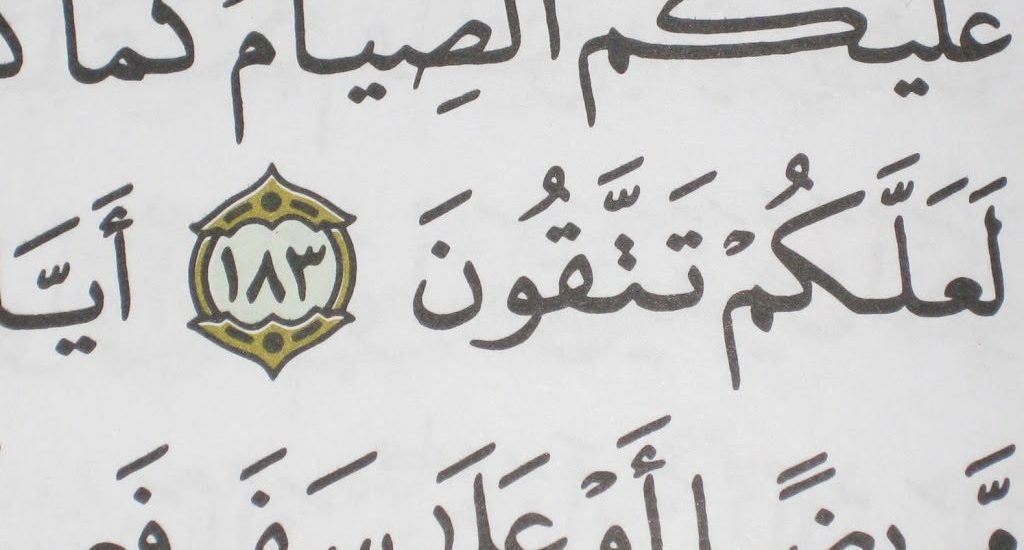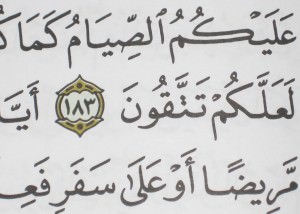Ramadan: Being Conscious of God

 |
| “Fasting is prescribed for you…that you may taqwa.” (Qur’an 2.183) |
Taqwa. It’s a hard word to pronounce correctly unless you’ve mastered Arabic pronunciation. The q-sound (qaf) is made far back in the throat, not like the more superficial k-sound (kaf). And because of the q-sound, the pronunciation of the preceding ta- is changed.
Taqwa is also difficult to define precisely. It often appears in English translations of the Qur’an as “fear of God,” but that translation is more like a superficial k-sound than the deep q-sound that appears at the heart of the word. Taqwa is even more difficult to consistently manifest in one’s life.
But it’s an important word in the Qur’an, used some 250 times in a text that is roughly the length of the New Testament. It’s critical for understanding the goal of Ramadan and indeed for understanding Islam. It appears at the beginning of a section in the Qur’an which explains the reasons for fasting: “O you who believe! Fasting is prescribed for you as it was prescribed for those before you that you might taqwa” (2.183). It then is reiterated at the end of that section: “And so God makes His signs clear to humanity that they may taqwa” (2.187).
Taqwa is perhaps best defined as being conscious of God, being aware of God’s omnipresence, omnipotence, and omniscience. It is by cultivating this consciousness and consistently manifesting it in our lives and actions that we become true disciples of God’s prophets and true believers in God. It is not a superficial adherence to religious laws or ritual observances.
It’s not like the k-sound made in the mouth which can speak words without meaning or action. It’s far deeper than that. It’s more like the deep sound of the q in taqwa made in the throat through which we receive the breath that sustains us. As stated in the Qur’an:
It is not righteousness that you turn your faces to the East or West [in prayer]; but righteousness belongs to those who believe in God, the Last Day, the Angels, the Book, and the Prophets; who give of their wealth out of love for Him to family members, the orphans, the poor, the wayfarer, the needy, and those in bondage; for those who are steadfast in prayer, who give alms, fulfill their obligations, and who are patient in affliction and distress. Such are those who are truthful and such are those who taqwa. (2.177)
Taqwa then describes the person whose inner life of faith is reflected outwardly in one’s relationship with and care of the other. True belief in God must effect change in all aspects of our lives. Just as the q-sound changes the pronunciation of the letters around it, so too does taqwa change us completely.
The fast of Ramadan is one of the mechanisms by which Muslims hope to become more conscious of God, of beauty and goodness in the world, in others and in themselves. It is a time to be especially awed and overwhelmed by the eternal presence of God, always and everywhere, and at the same time, to recognize our own frailties and faults, and attend to the most vulnerable among us.
Fr. Michael Calabria, OFM is a Franciscan friar of Holy Name Province. For the past nine years he has taught Arabic and Islamic Studies at St. Bonaventure University, and is currently pursuing his doctorate in Arab and Islamic Studies with the University of Exeter, UK, and serving as a chaplain-in-residence at Georgetown University. Fr. Michael has lived, ministered and taught in Egypt, has traveled extensively in the Middle East, and speaks widely on Islam, Middle Eastern Affairs, and Christian-Muslim Relations.

